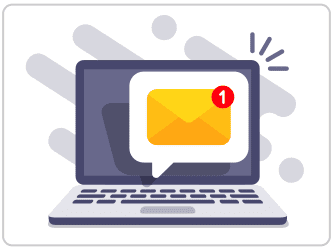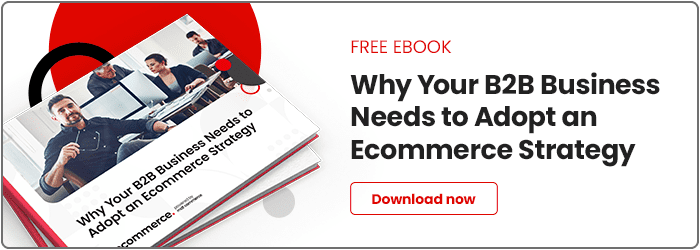
5 Proven B2B Ecommerce Marketing Strategies To Boost Your Sales

Marketing Team
k-ecommerce
In B2B, customers are increasingly and more frequently turning to ecommerce stores to make purchases: willing to spend up to $500,000 on a single ecommerce transaction.
So, to meet customers where they are and to capitalize on that revenue opportunity, as many as 82% of B2B businesses now sell via their own ecommerce website.
But just because the vast majority of B2B businesses are selling online doesn’t mean they’re also successfully upselling or cross-selling online. (And for many, the cause of this shortcoming is poor —or at times nonexistent— marketing initiatives).
Case in point? In the B2B world, only 56% of B2B companies incorporate digital marketing into their larger ecommerce and customer engagement strategy.
But to grab and hold the attention of your B2B audience and drive ecommerce traffic to your website in ways that lead to online sales, you need a systematic approach to marketing and customer engagement.
What Is B2B Ecommerce Marketing?
Many B2B companies are currently seeing a slow and steady build to their sales: with the major catalyst for growth being ecommerce. And unsurprisingly, part of getting your ecommerce strategy right is mastering online B2B marketing, too.
Whether you’re promoting your products and services to other businesses via your website, social media, email, or search engines, you’ll need to leverage effective B2B ecommerce marketing strategies to fill your pipeline with qualified prospects.
Simply put, the goal is to attract, engage, and delight businesses into becoming new customers and, eventually, repeat customers.
B2B vs. B2C Marketing: Understanding Key Differences to Better Tailor Your B2B Approach
B2B marketing addresses professional buyers’ practical requirements and involves longer sales cycles with multiple negotiation stages.
While B2C transactions are often one-off purchases and have lower prices, B2B buyers prioritize building lasting relationships with suppliers due to the significant impact of purchasing decisions on business operations.
According to HubSpot, B2B and B2C companies also vary widely in how they strategically personalize their marketing.
Tailoring personalization tactics to their customer needs and their unique business complexity, B2B businesses tend to prioritize email campaigns and ecommerce personalization through customer-specific pricing while B2C businesses more effectively personalize with mobile/SMS customer engagement, abandoned cart reminders, and product recommendations.

Understanding exactly what makes B2B ecommerce marketing unique is essential to meaningfully personalizing experiences in a way that will keep happy customers coming back.
5 Tried-and-True B2B Ecommerce Marketing Strategies (That Work Even Better Together)
B2B customers can be a tough crowd. But you can encourage them to visit and even purchase from your B2B ecommerce website by implementing these marketing strategies:
1. Content Marketing
B2B customers are thoughtful buyers. Considering how most B2B transactions are high-stakes, they have to be. They go into purchases well-informed and with a goal in mind. They’re looking for a partner to trust, not just a supplier. And they’re often using the content on a vendor’s website to guide their educational journey before and during a purchase.
According to DemandGenReport data, almost 70% of B2B buyers find and digest content directly from a vendor’s website. Before contacting a salesperson, 41% of them will read at least 3 pieces of content (articles, blog posts, etc.)
Creating high-quality and relevant messaging is an effective way to educate, inform, and build trust among your audience as they move through their customer journey. And as an added bonus, it’s exactly how they want to consume information from you, too.
2. Search Engine Optimization (SEO)
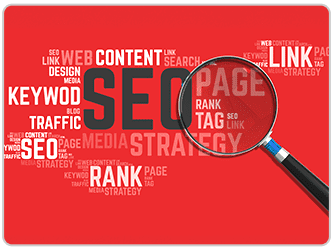 The benefits of SEO for B2B ecommerce companies are massive. After all, there’s no better way to be found online than to rank your website in the search engine results pages (SERPs). Often, marketing teams’ highest-qualified B2B leads come from their SEO efforts.
The benefits of SEO for B2B ecommerce companies are massive. After all, there’s no better way to be found online than to rank your website in the search engine results pages (SERPs). Often, marketing teams’ highest-qualified B2B leads come from their SEO efforts.
Still, only 64% of marketers actively spend time working on search engine optimization (SEO) today — even though SEO generates significantly more sales than PPC. That means there’s another 36% of B2B marketers missing a major growth opportunity.
But for those businesses who are actively investing —or looking to invest— in SEO, it’s important to remember: It’s people who Google things, not businesses. Behind every business that buys your products are living people with questions they need answered, like:
- What problem are you solving for them?
- How does your product(s) solve their problem?
- How is your product(s) better than the competition at solving their problem?
Keep the above questions in mind as you form and implement your SEO strategy — from keyword research to on-page optimization, content creation, and backlink building.
3. Social Media Marketing
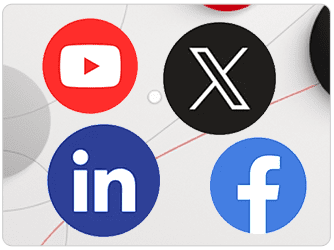 Business buyers scroll their social media feeds like everyone else. They will also buy if they come across something relevant. And it’s many B2B marketers’ top revenue-driving channel.
Business buyers scroll their social media feeds like everyone else. They will also buy if they come across something relevant. And it’s many B2B marketers’ top revenue-driving channel.
To capture their attention effectively, craft social media content that showcases your company culture and highlights your expertise while delivering valuable insights that resonate with your audience.
It also helps to engage with industry influencers and participate in relevant conversations to expand your reach and credibility within your niche and the B2B community. When your interactions get noticed, the algorithms may give your content a boost in the feed, which builds brand awareness and increases your reach.
But don’t try to be everywhere at once. Pick only the social media platforms where your customer base is more likely to hang out. For instance, if you’re targeting businesses in the technology sector, platforms like X (formerly Twitter) and LinkedIn may be the most effective.
 4. Email Marketing
4. Email Marketing
Fostering relationships with potential customers is crucial to effective B2B ecommerce marketing.
And what better way to nurture your B2B relationships than email marketing? After all, when a key decision-maker signs up for your email newsletter, they’re essentially giving you permission to send them more information about your offerings.
It’s no surprise that half of B2B marketers say email marketing has the biggest impact on their omnichannel strategy.
But since B2B sales cycles are long, make sure to plan your email campaigns in stages to send relevant emails that move prospects along the buyer’s journey.
5. Paid Advertising
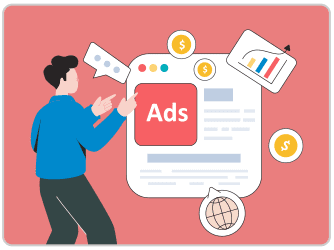 Paid advertising enables B2B brands to target specific audiences and drive traffic to landing pages and online stores.
Paid advertising enables B2B brands to target specific audiences and drive traffic to landing pages and online stores.
It’s even more powerful as a marketing strategy because B2B prospecting relies heavily on precise targeting. B2B paid advertising often involves targeting by industry, job title, company size, and other business-related criteria to reach decision-makers effectively.
By using tools like Google Ads, LinkedIn Ads, and industry-specific platforms, you can reach stakeholders within your niche.
Given the length of B2B sales cycles, some leads will lose interest in or forget about your offerings before making a purchase. By launching remarketing campaigns via paid ads, you can remind leads why they need your products.
Making B2B Ecommerce Part of Your Business Strategy
Running a B2B ecommerce business has its challenges. When dealing with large purchases, multiple decision-makers, and varying buying processes, getting your prospects to proceed at checkout isn’t so simple — and neither is meaningfully engaging with them post-sale.
Remember, marketing your B2B business is only the first step.
To understand how your B2B marketing approach should fit into your larger ecommerce strategy, download our ebook.



